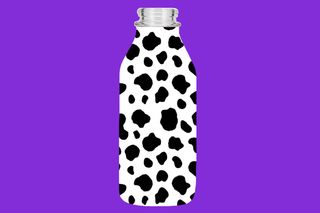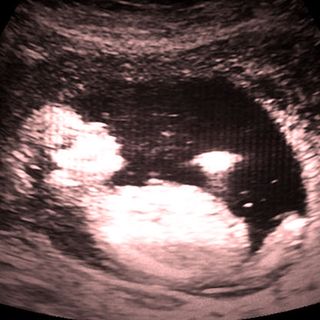
Estrogen Found In Cow’s Milk Is Safe for Adult Consumption, Says Study
Whether it’s healthy for kids remains to be studied.

We know that so-called endocrine disruptors — man made substances that mimic the impact of hormones, or mess with the production of hormones — can have a significant impact on human health. By throwing off our natural balance of hormones, they can create long term damage to fertility or our bodies’ ability to fight various cancers. One related area of concern is the impact of animal hormones that come through our food supply. For example, cows who are lactating — and producing the milk we drink — produce estrogen that makes its way into their milk supply. But when those hormones make their way through a cow’s system and into their milk supply, what happens to the humans who later consume that milk?
According to a new review, published in the European Journal of Endocrinology, the estrogen found naturally in cows’ milk is likely to be safe for human consumption in adults. The review brings together scientific evidence from over a dozen rodent and human studies that examined the effects of ingesting estrogen-containing cows’ milk on fertility and the risk of cancer development. The findings of the review suggest that the levels of estrogens found naturally in milk are too low to pose health risks to adults.
Cow’s milk is a controversial part of the human diet. But because industrialized farming has further changed the estrogen levels in cows’ bloodstreams, and therefore milk supply, the potential impact of these farming practices on human health is an important area of interest. Further, we are only now beginning to understand the impact of endocrine disruptors and ingested hormones on human fertility and on cancers whose spread is aided by the presence of certain hormones.
In this review, Professor Gregor Majdic and Professor Tomaz Snoj from the University of Ljubljana in Slovenia, reviewed the evidence from over a dozen studies on milk consumption. In most of the studies they analyzed, there was no reproductive health or cancer impact on health; in the ones where there was a harmful effect, the estrogen consumption was far beyond what a normal human intake would be.
Professor Gregor Majdic said, “The majority of studies we reviewed concluded that the concentrations of oestrogens found naturally in milk are too low to pose a risk to reproductive health or cancer development in adults. However, studies are lacking that look at any harmful effects of hormones from cows’ milk on baby and child development and health.”
Related


The World Needs More Research Into Stillbirth
